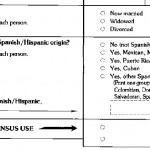 As discussed in this post a couple of weeks ago, Paige Patterson (president of Southwestern Baptist Theological Seminary in Fort Worth, Texas) has been in the news, lately, for audio recordings of statements made in 2000. In those recorded statements, Patterson purportedly said abused women should focus on praying and “be submissive in every way that you can” and not seek divorce. He went on to say, “I have never in my ministry counseled anyone to seek a divorce and that’s always wrong counsel.”
As discussed in this post a couple of weeks ago, Paige Patterson (president of Southwestern Baptist Theological Seminary in Fort Worth, Texas) has been in the news, lately, for audio recordings of statements made in 2000. In those recorded statements, Patterson purportedly said abused women should focus on praying and “be submissive in every way that you can” and not seek divorce. He went on to say, “I have never in my ministry counseled anyone to seek a divorce and that’s always wrong counsel.”
As disturbing as this 18 year old recording is (and it is definitely disturbing), even more alarming is Patterson’s current refusal to recognize or admit (the biblical word is ‘confess’) there was anything wrong with his prior statement.
Patterson has issued several statements claiming to have been misrepresented or misunderstood. He has apologized for a separate incident in which he spoke of a 16 year old girl in a sexually objectifying manner. He has ‘apologized’ for people having misunderstood him.
However, on the topic of his counsel to an abused wife, not only has he refused to apologize, but he has also doubled down…asserting the advice he gave was sound advice and biblically based. He clarified that he has counseled “on more than one occasion” women to leave abusive husbands, and that physical or sexual abuse of any kind should be reported “to the appropriate authorities.” He then reaffirmed his position on divorce, “I have also said that I have never recommended or prescribed divorce. How could I as a minister of the Gospel? The Bible makes clear the way in which God views divorce.”
Sadly, many Christians have backed Patterson’s position as being sound biblically-based counsel.
So, let’s review Patterson’s position.
Patterson (with the support of many Christians) counsels abused wives to focus on praying, “be submissive in every way that you can” and not seek divorce.
This is horrendous counsel! Study after study has demonstrated being more submissive generally invites more abuse. It props up the abuser’s skewed perspective that he is somehow justified in abusing his spouse. Likewise, study after study has demonstrated that the abuse tends to escalate over time, becoming increasingly harmful as the abuser seeks higher levels of power, control, and self-gratification.
The counsel of Patterson and other proponents of Divorce Mythology condemns an abused spouse to a lifetime of continued, ongoing, escalating abuse, with no hope of escape or peace.
That counsel does not sound much like the Good News of the Gospel. It has little in common with the oft-repeated biblical theme of Redemption from covenants of abusive bondage. It has no place in the description Jesus gave of Himself at the start of His earthly ministry:
The Spirit of the Lord is upon Me,
Because He anointed Me to preach the gospel to the poor.
He has sent Me to proclaim release to the captives,
And recovery of sight to the blind,
To set free those who are oppressed,
To proclaim the favorable year of the Lord. (Luke 4:18-19)
Nor is it reflected in how our God of Divorce modeled divorce from an abusive partner who repeatedly and willfully violated the covenant vows.
Yet, despite strong biblical evidence to the contrary, Patterson and his supporters (in apparent idolatry of the institution of marriage) have concluded divorce is forbidden…thereby condemning those they counsel to a lifetime of slavery to evil.
Now, this is the point on which Patterson and his supporters call foul, claiming he has been misrepresented and misunderstood. After all, Patterson claims he has “on more than one occasion” counseled women to leave their abusive husbands.
Clearly, by “leave” Patterson did not mean “divorce,” since he also said, “I have never recommended or prescribed divorce.”
So, he counseled them to leave…without divorcing…which leaves the abused spouse still legally bound to her abuser…for life. The legal bond provides easy access for the abuser to continue tormenting her. In many cases the marriage gives him legal access to her finances, providing yet another avenue of ongoing abuse.
Moreover, the whole premise of forbidding divorce is this crazy notion that no matter how egregiously the marriage vows have been violated, no matter how unrepentantly the abuser has trampled the sacred vows in his treachery against the spouse he swore to love, honor, and cherish…that somehow the abused spouse is still under obligation to the covenant vows.
With divorce forbidden, the pressure to reconcile with the abuser is incredibly high. If divorce is forbidden, she is still married with all the legal and covenant obligations that implies. The abuser, knowing this, will take full advantage, faking repentance to regain control…and conning church members, family, and friends into becoming allies of the abuser, “How can you be so cold-hearted toward your husband? He feels really bad for what he did.”
And because he is still her legally wedded husband, she has no good response…and may be ensnared in the trap of returning to her abuser. After all…doesn’t the Bible have much to say about how we are to treat a lawfully wedded spouse?
Meanwhile, Patterson apparently sits unconcernedly on the sidelines, claiming “as a minister of the Gospel” he has no other choice.
Contrast Patterson’s position with God’s position toward Israel when they were enslaved to Pharaoh:
I am the Lord, and I will bring you out from under the burdens of the Egyptians, and I will deliver you from their bondage. I will also redeem you with an outstretched arm and with great judgments. (Exodus 6:6)
God made a point of saying He would not only deliver Israel from bondage, but He would also redeem them. He not only physically separated Israel from their oppressor, but He also brought about the dissolution of the covenant bonds, so they had no legal obligations or ties to Pharaoh.
Since Patterson claims he is following scripture in giving this counsel to leave without divorcing, let’s see what scripture actually says on this topic.
When a man hath taken a wife, and married her, and it come to pass that she find no favour in his eyes, because he hath found some uncleanness in her: then let him write her a bill of divorcement, and give it in her hand, and send her out of his house. And when she is departed out of his house, she may go and be another man’s wife. (Deuteronomy 24:1-2, KJV)
The Law given to Moses by God clearly makes provision for divorce by requiring a certificate of divorce to legally dissolve the marriage, leaving both partners free to remarry.
Note that the certificate of divorce is scripturally required. If a man separates from his wife, God requires him to legally divorce her. A man is not biblically permitted to separate from his wife while trying to retain some sort of legal control by refusing to divorce.
God did not forbid divorce. He did forbid separation without divorce.
God did not forbid divorce. He did forbid separation without divorce. Click To TweetSome claim that Jesus gave commands concerning divorce that reversed the commands God gave Moses. But that makes no sense. In The Sermon on the Mount, Jesus said,
Do not think that I came to abolish the Law or the Prophets; I did not come to abolish but to fulfill. For truly I say to you, until heaven and earth pass away, not the smallest letter or stroke shall pass from the Law until all is accomplished. Whoever then annuls one of the least of these commandments, and teaches others to do the same, shall be called least in the kingdom of heaven; but whoever keeps and teaches them, he shall be called great in the kingdom of heaven. (Matthew 5:17-19)
Jesus did not replace, reverse, add to, subtract from, or abolish the law given to Moses. He supported the law and transcended the law by showing righteousness can never be attained through strict adherence to external rules, because true righteousness is a condition of the heart. In the same sermon, Jesus went on to say,
For I say to you that unless your righteousness surpasses that of the scribes and Pharisees, you will not enter the kingdom of heaven. (Matthew 5:20)
Our righteousness must exceed that of the Pharisees, because the Pharisees were seeking to attain righteousness thru strict adherence to external rules. Jesus continued His sermon with a series of examples beginning “You have heard…” in reference to the law and continuing “…but I say unto you…” with a demonstration of how God calls us to transcend the law through our heart attitude.
In the first of this pattern of examples, Jesus said,
You have heard that the ancients were told, ‘You shall not commit murder’ and ‘Whoever commits murder shall be liable to the court.’ But I say to you that everyone who is angry with his brother shall be guilty before the court; and whoever says to his brother, ‘You good-for-nothing,’ shall be guilty before the supreme court; and whoever says, ‘You fool,’ shall be guilty enough to go into the fiery hell. (Matthew 5:21-22)
Jesus starts with the law, “Thou shalt not commit murder,” then goes on to transcend the law by showing that just keeping the external law is insufficient. Righteousness is a heart condition, and a heart that harbors bitterness and anger cannot be righteous. Jesus did not overturn, void, replace, add to, or take away from the law, “Thou shalt not murder.” Rather, He transcended the law by demonstrating that righteousness is more than rigorously keeping external laws. Righteousness is a matter of the heart and can only be attained through the power of the Holy Spirit in giving us a new heart and making us a new creation.
Then Jesus moved on to the second in this pattern of examples:
You have heard that it was said, ‘You shall not commit adultery’; but I say to you that everyone who looks at a woman with lust for her has already committed adultery with her in his heart. (Matthew 5:27-28)
Again, Jesus is agreeing with the Old Testament Law as being righteous and true…and He again transcends the law by showing external behavior is insufficient for righteousness. If someone desires in their heart to commit adultery, their heart is evil, even if they don’t physically violate the law. Stricter rules do not help. We need a new heart thru the power of the Holy Spirit.
In His third in this pattern of examples, Jesus addresses the Law of Divorce from Deuteronomy:
It was said also, Whosoever shall put away his wife, let him give her a writing of divorcement: but I say unto you, that every one that putteth away his wife, saving for the cause of fornication, maketh her an adulteress: and whosoever shall marry her when she is put away committeth adultery. (Matthew 5:31-32, ASV)
Again, Jesus quotes the law from Deuteronomy, “Whosoever shall put away his wife, let him give her a writing of divorcement.” He does not reverse the law, alter the law, nullify the law, add to the law, nor take away from the law. Once again, Jesus transcends the law by demonstrating the heart issue:
…but I say unto you, that every one that putteth away his wife (separates without a certificate of divorce), saving for the cause of fornication, maketh her an adulteress: and whosoever shall marry her when she is put away (separated without a certificate of divorce) committeth adultery. (emphatic parenthetical phrases added for clarification)
In quoting these two verses, I chose the American Standard Version as being truer to the original Greek and consistency of translating the same word the same way throughout. Many English translations use the word “divorce” to replace “put away” in some instances. However, the original Greek uses the same word (apolyo) all three places in these verses, and the most literal translation is “put away”…which could be either with or without a certificate of divorce.
The law Jesus quoted from Deuteronomy explicitly requires a man to provide a certificate of divorce if he puts his wife away (separates from her). We know Jesus was not contradicting, changing, overturning, adding to, or taking away from the law given to Moses…as Jesus had just stated He was not doing that. We know Jesus was, in fact, transcending the law by demonstrating righteousness is a matter of heart condition that cannot be attained through rigid conformity to external rules.
Therefore, it is clear that just as in the two previous examples, Jesus was supporting and agreeing with the original law while also demonstrating its insufficiency without a righteous heart. In these two verses, Jesus agrees with the law that, yes, a man must provide a certificate of divorce if he separates from his wife. Then He goes on to say that if the man separates from his wife without legally divorcing her, then he is guilty of causing her to commit adultery…and causing anyone who marries her to also commit adultery…because she is still legally wed to her first husband who failed in his obligation to grant her a legal divorce when he separated from her.
Jesus did not forbid divorce (which would have directly contradicted the law God gave to Moses). Jesus agreed with the law forbidding separating without divorce.
Jesus did not forbid divorce. He forbade separating without divorce. Click To TweetJesus did not equate remarriage after divorce with adultery (which would have directly contradicted the law God gave Moses). Jesus transcended the law by saying a man who separates from his wife without legal divorce has taken upon himself the guilt of any future adulterous relationships she may enter into.
Lest anyone mistakenly turn this into a gender-biased issue in which God’s intent for a woman separating from her husband is somehow different from a man separating from his wife, the Apostle Paul expounds on this same theme. In giving pastoral direction to a woman who is separated from her husband but still legally married, Paul instructs her to either reconcile with her husband or divorce. Paul is very clear in admonishing her to not indefinitely remain married-yet-separated.
…but if she does leave, she must remain unmarried, or else be reconciled to her husband… (1 Corinthians 7:11)
In this verse, ‘unmarried’ (agamos) clearly means ‘divorced.’ I discuss this further in this post and this post.
The counsel Patterson claims as the only advice he could give “as a minister of the Gospel” directly contradicts what the Bible says on the topic.
I want to add one more thing. Some of the people reading this post may currently be separated from their spouse while legally married. This post is not intended to heap guilt onto your already overly-stressed life.
As Jesus so eloquently demonstrated in the Sermon on the Mount, righteousness can never be attained through strict adherence to external laws. No law could ever address every possible situation in human relationships. Jesus sent us the Holy Spirit to guide us in difficult life decisions. It is not my place to tell you what needs to be done in your unique and very personal situation.
Furthermore, I believe temporary separation to find safety, to find healing, to make decisions, is often wise. I believe permanent separation without divorce is usually unwise and tends to lead to a very stressful unsettled state of existence.
This post is intended to demonstrate the falseness of counselors claiming biblical authority in always counseling abused spouses to never divorce…to separate if needed but never divorce. As a general rule, this counsel is usually both unwise and biblically unsubstantiated.
Your thoughts?






